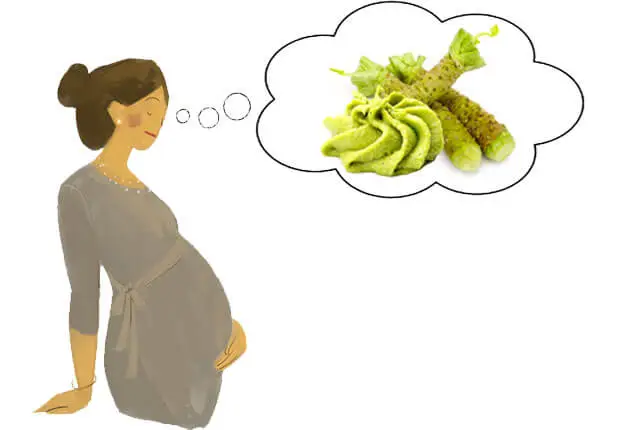💡 Originally published in March 2023. Updated in July 2025.
Pregnancy cravings can be wild — one day it’s fruit, the next it’s fire. And few things bring the heat like wasabi. But is wasabi safe during pregnancy, or should that spicy green paste stay off your plate for now?

Wasabi in pregnancy brings up a lot of questions, especially since it’s usually served with sushi, which often isn’t pregnancy-friendly. Still, wasabi sometimes pops up in unexpected places, like noodle bowls or veggie snacks, which can be part of a healthy pregnancy diet.
Quick Take for Mamas:
Yes, wasabi is generally safe to eat during pregnancy, in small amounts. Whether you’re eating real wasabi or the more common horseradish-based version, moderation is key. Too much can cause digestive discomfort or rare side effects.
✅ When in doubt, opt for imitation wasabi or a gentler alternative like pickled ginger.
What is Wasabi?
Wasabi is a traditional Japanese condiment that adds a spicy, nose-tingling punch to foods like sushi, sashimi, and soba noodles. Its bright green color and sharp flavor are unmistakable and unforgettable!
True wasabi comes from the Wasabia japonica plant, and it’s typically grated into a fresh paste just before serving. But here’s the twist: real wasabi is incredibly rare and expensive. It’s difficult to grow, delicate to handle, and usually reserved for high-end restaurants.
Most “Wasabi” Isn’t the Real Thing — And That’s a Good Thing!
Chances are, the “wasabi” you’ve eaten isn’t actually wasabi at all. Most wasabi served in restaurants or found in grocery stores is a mix of horseradish, mustard, and green food coloring. It mimics the flavor and heat of real wasabi, but it’s milder, easier to produce, and much more accessible.
💚 Good news for pregnant women: imitation wasabi tends to be gentler on the stomach and is considered safer during pregnancy when eaten in moderation.
Knowing what wasabi really is (and isn’t) makes a big difference, especially when you’re expecting. So now, let’s take a closer look at how this bold condiment fits into a healthy pregnancy diet.
If you’re reaching for wasabi because of sushi cravings, keep in mind that not all sushi is safe during pregnancy, especially raw fish.
For detailed tips on pregnancy-safe sushi options, check out my full guide on eating sushi during pregnancy.
Is Wasabi Safe During Pregnancy?
There’s no official research yet that directly studies wasabi in pregnancy. That means it hasn’t been proven harmful, but it also hasn’t been confirmed completely risk-free either.
That said, eating small amounts of wasabi while pregnant is generally considered safe by most healthcare providers, especially if you’re healthy and not dealing with pregnancy complications.
But there’s a catch: wasabi gets its fiery flavor from a natural compound called allyl isothiocyanate. In small doses, it’s perfectly fine (and even fun!). In large amounts, though, it can cause irritation — and possibly more.
In fact, a 2025 scientific review of freshly produced allyl isothiocyanate (AITC) — the spicy compound in wasabi — found that it may offer antimicrobial, antioxidant, and anti-inflammatory benefits, making it potentially useful as a natural additive in food.¹ While the study didn’t focus on pregnancy, it supports the idea that small amounts of AITC are not harmful and might even be beneficial as part of a healthy diet.
¹ Source: Health Benefits, Applications, and Analytical Methods of Freshly Produced Allyl Isothiocyanate (Foods, MDPI, 2025)
What Happens If You Eat Too Much Wasabi During Pregnancy?
Eating a bit of wasabi on your noodle bowl? Totally fine. Eating a big spoonful or adding it to every meal? That might be pushing it.
Here’s why too much wasabi (or even too much of the imitation kind) can cause problems during pregnancy:
1. Digestive Troubles
Spicy foods can irritate your already sensitive digestive system. Heartburn, bloating, nausea, or reflux may get worse, especially in the second and third trimesters.
2. Nasal and Throat Irritation
That intense “nose hit” you get from wasabi? It comes from those same natural compounds, which can irritate your nasal passages, throat, or even cause shortness of breath in rare cases.
3. Allergic Reactions
Though uncommon, some people are allergic to wasabi or horseradish. If you experience itching, swelling, or trouble breathing, stop eating it and call your doctor.
4. Possible Blood-Thinning Effects
Allyl isothiocyanate may have mild blood-thinning properties, which could be an issue if you’re on blood-thinning medications or approaching labor (since it might slightly increase bleeding risk).
5. Preterm Labor or Miscarriage?
Some animal studies have raised concerns about very high doses of spicy compounds, such as those found in wasabi. But don’t worry — these results haven’t been confirmed in humans. Still, it’s always smart to play it safe and keep spicy foods in moderation.
Safer Alternatives to Wasabi During Pregnancy
If you’re unsure about eating wasabi but still want that little extra zing with your sushi, here are a few pregnancy-friendly alternatives to try:
✅ Imitation Wasabi
The kind most restaurants serve — made from horseradish, mustard, and food coloring — is milder than real wasabi and is generally considered safe in small amounts.
✅ Pickled Ginger (Gari)
This sweet-and-tangy sidekick is commonly served with sushi and can actually help with digestion and nausea. It’s gentle, refreshing, and 100% safe to enjoy while pregnant.
✅ Soy Sauce or Low-Sodium Tamari
Just a dash can boost flavor without adding heat. Opt for low-sodium versions if you’re watching your salt intake during pregnancy.
Final Thoughts: Can Pregnant Women Eat Wasabi?
Here’s the bottom line:
- Yes, you can eat wasabi during pregnancy — in moderation.
- Stick to small amounts, especially if you’re prone to heartburn or already dealing with pregnancy-related tummy troubles.
- When in doubt, go with imitation wasabi or play it safe with pickled ginger.
And always, always trust your instincts — and your care provider. If something doesn’t feel right, check in with your doctor or midwife.
You’ve got this — and your taste buds can still have a little fun, even with baby on board. 💚
Disclaimer: This post is for informational purposes only and does not replace medical advice. Always consult your doctor or OB-GYN before making any changes to your diet or supplement routine while pregnant.
